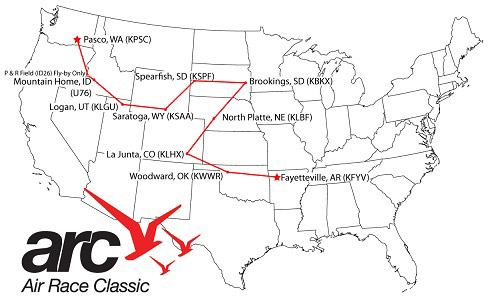
Entries for the 2013 Air Race Classic, the longest running all-women pilots transcontinental air race, are now at 80 percent and are expected to reach a goal of 55 teams before the April 1 deadline.
This year’s event is a 2,100 nautical mile, day-VFR race from Pasco, Wash., to Fayetteville, Ark., that will be run June 18 through 21. Racers in this year’s event continue a legacy that stretched back to 1929, when 20 women flew from Santa Monica, Calif., to Cleveland. Back in those days, women were not allowed to fly in men’s air races, and so they organized their own. The Women’s Air Derby evolved into the All Women Transcontinental Air Race, commonly referred to as the Powder Puff Derby.
Terry Carbonell, the race’s director, attended the Women in Aviation International convention in Nashville, Tenn., March 14 through 16 to educate attendees about the race and recruit women for teams. “The race is the greatest learning experience a woman pilot can have,” she stated. “You can meet 150 of your newest best friends and learn about every aspect of aviation. Ladies, especially those of college age, never fly beyond their [local] sectional chart. This race gives them real life experience in real time.”
Because part of this year’s race will be flown in mountainous areas, racers are required to take an Air Safety Institute online course on mountain flying. The course covers the challenges of mountain flying and how pilots can minimize the risk.
The race allows participants to learn about making decisions on the fly, said Carbonell. “What we do with the race is we take away your tools. We take away the option of route. We take away night flying and IFR. You can’t alter your travel days,” she said.
Part of the problem of being a female pilot is they typically fly with male companions, said Carbonell. “If the males let us fly the aircraft, they tend to say things like we’re flying too fast, too slow, or too high. Women tend to defer to them and we don’t develop our own self confidence,” she said. “The race is a chance to get away from the guys and learn our own judgment and experience, along with gaining more confidence in our skills.”
The age of the racers varies, said Carbonell. “Our youngest flyer was 18 years old. She missed her high school graduation to do the race. Our oldest flyer was the late Ruby Sheldon, who was 92,” she said. “We have everything from professional pilots to folks who prefer small aircraft, including air traffic controllers, mechanics, doctors, and lawyers participate.”


